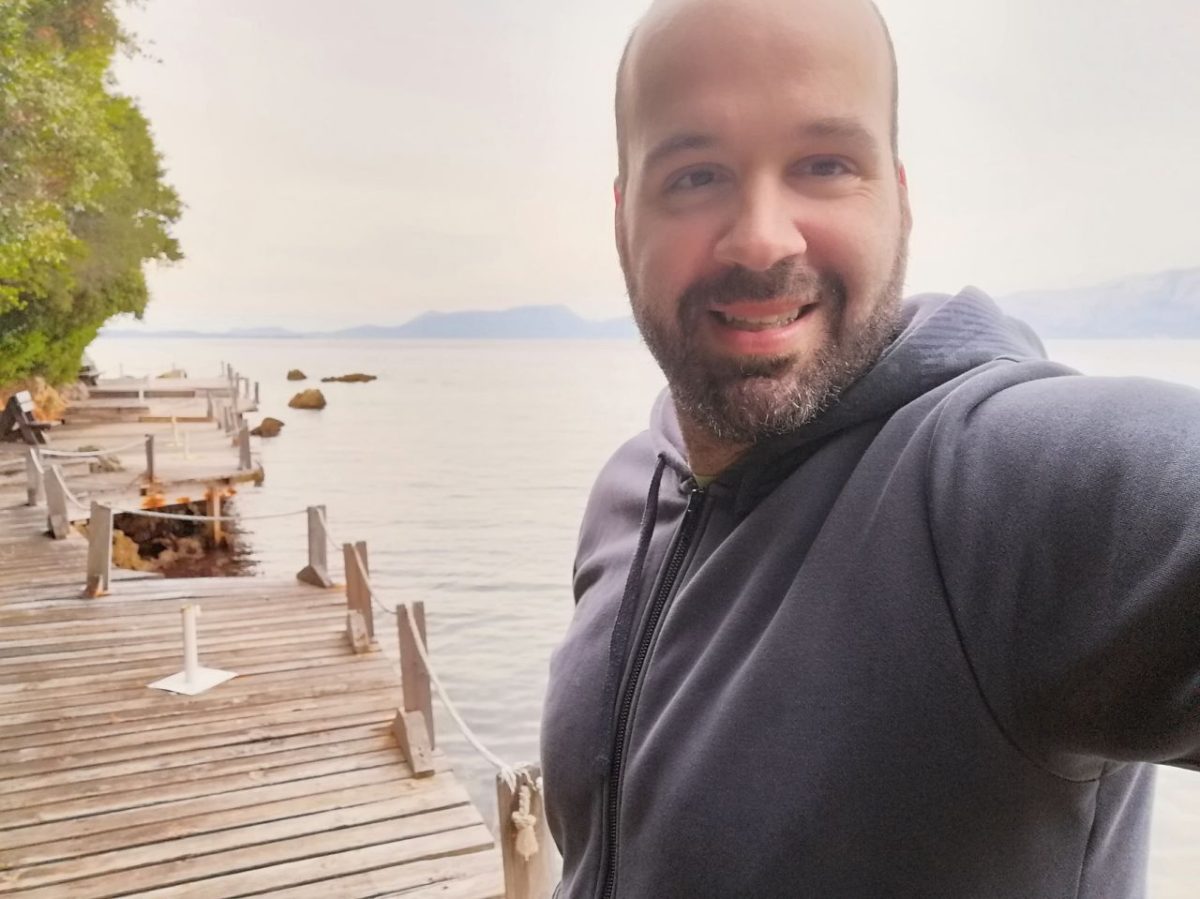This is a complete guide to overcoming interview anxiety.
In this guide you’ll learn:
- A Neuro-Linguistic Programming (NLP) approach to dealing with interview anxiety.
- Why picturing your interviewer in their pants may help but has also its limitations.
- Better ways to calm your anxiety and achieve peak performance during interviews.
- How to stay present with your interviewer by focusing on neutral stimuli.
- My favourite approach to interview anxiety—and anxiety in general.
Let’s get started.
NLP Tricks for Interview Anxiety
“Visualise the managing director in their pants”.
“Imagine they are taking a poop”.
You may have heard these mind tricks.
Do they really work? Let’s dive in.
In NLP terms, this technique is called changing submodalities of sensory experience.
Which means…
If you change the way you see someone—how they look, how they sound, how they move, what they do—you can transform your internal experience of them and how you think, feel and act.
Now, you’ll ask… how do I decide what sensory variables to change?
It depends.
When my clients say, “I have interview anxiety”, I ask questions:
- Where are you?
- Who’s there?
- How are they dressed?
- What are you feeling?
- What are you thinking?
- Is the interviewer sitting on your right?
- Or are you on a Webex call?
This is how they teach me their interview anxiety and I pay particular attention to strong emotional cues.
Then, I invite them to change a few things in their interview setting and we play the interview back to see how their experience changes.
Here are some examples of changing sensory experience:
- Visualise the interviewer being tiny and you looking like a giant in front of them.
- Change the pitch of their voice and make them sound as if they breathed helium.
- Imagine them being with their family and playing with their kids on holiday.
- Imagine them watching the Titanic and crying like a baby.
To come up with your own tweaks, close your eyes and visualise a typical interview situation. What do you see? How do they look? What are they doing? What are you focusing on?
Then, distort your sensory reality. What if they didn’t look like that? What if they did that instead? What if YOU were interviewing them?
Try different things both during interview preparation and real interviews and see how your experience changes.
One of the NLP axioms says, “There is no failure; there is only feedback”.
You can always keep things in perspective.
The Managing Director was a first-year Analyst 10-15 years ago experiencing the same interview anxiety as yours.
They still shit themselves today when they have to explain poor results to management.
And this is just one opportunity of the many that you will have.
When Too Much Perspective Can Go Wrong
OK, now let’s talk about the other side of the coin.
I am an NLP certified practitioner and as much as I love NLP, all these change-submodalities-perspective tricks are “thinking-brain” stuff that may work for you or may not.
It also depends on your stress arousal levels.
If your “survival brain”—the evolutionarily old, caveman brain—has perceived the whole interview thing as critical/threatening, it WON’T give a shit about all these “thinking brain” tricks. Not only these tricks won’t work but they may turn on more stress!
Because think about it. Your survival brain is mobilising energy so that you can cope with the challenge, and your thinking brain is going like, “You’re not stressed. Come on, you know you can pull this off. You bloody bastard, shut the f*** up. Don’t be a p****”.
Of course, your survival brain is exaggerating and it doesn’t have to create all this mess. I get it. But, if your survival brain and autonomic nervous system were not that sensitive, the human species wouldn’t have survived—and you and I wouldn’t be here talking about interview anxiety.
When your thinking brain stuffs your survival brain with too much rationalising and perspectivising, it creates friction, more frustration, self-criticism—and guess what? More stress!
Also, here’s the other thing: When you bet all your money on these tricks, the moment you realise that they’re not working, you experience a sense of hopelessness which can throw you into what we call a “freeze”. This is the final line of defence that your autonomic nervous system has to offer in a threatful situation.
In a freeze state, your cognitive abilities and your brilliant intellect are switched off. That’s what happens when you get the easiest questions wrong.
Here are the typical thinking-brain thoughts that can drive your survival brain bananas:
- Comforting: I’ve done some solid prep. I’ll crush it.
- Comparing: I don’t have it as bad as Bryan who doesn’t even have a job.
- Devaluing: People in some parts of the world don’t have access to drinking water.
- Criticising: Why can’t you just stay calm for God’s sake?
- Escaping/distracting: I’ll call James to stop thinking about this bloody interview.
If these endless thoughts are not calming you down, it’s better to respect that your survival brain has a different view and back off.
The Real Deal: Letting Go.
Yes, you guessed it right. This is my favourite technique, the one that helped me overcome my anxiety, back pain and other physical symptoms.
Let go of trying to control your anxiety and negative feelings.
Acknowledge the fear, the frustration, the anger, the hopelessness.
When you do that, you allow the negative feeling to wash away.
With practice, this can happen in seconds!
You may also call it forgiveness: You forgive yourself for not being able to control your emotions.
And when you do that, your consciousness rises. You are back home. Because you stopped fighting yourself.
When you let go, your thinking brain and your survival brain become allies. This is a signal to your nervous system that you are safe and there is no need to activate any more stress.
When you stop striving and genuinely say to yourself: “I know you want this job so much and I understand why you’re feeling like that. I’ve been pushing you to feel something else. I’ve been fighting you and wanting you to be someone else. Forgive me. Take as much time you need to process these feelings”.
These words can shift the situation in an instant. They can also have the power to switch off physical pain and tension in your body in seconds.
To put it in different words, what would happen if you gave up on fixing your interview anxiety?
It’s not an easy thing to ask for, especially when it comes to Type-A, ambitious and goal-oriented hardos like you and me—but it works.
Letting Go for Beginners
OK, I get it but how do I practice letting go?
This is what you can do:
When you become aware of all those the self-critising, denying, devaluing thoughts that I mentioned earlier, just stop and direct your attention to physical sensations in your body.
In what area of your body do you feel the anxiety?
You may feel some tension, tingling sensations, cold feet or hands, headache, whatever. Focus on those sensations.
You may also focus on the contact points between your feet and the ground, your butt and the chair, your lower back and the chair.
Notice the feeling of being supported by the chair and ground without you having to do anything at all.

The support you feel by the ground and the chair sends a signal to your survival brain and nervous system that you’re grounded, stable, and safe.
This is the fastest way to recovery.
You can practice this technique at home a few days before the interview or a few minutes before the interview.
You can practice during the interview too—and this is probably when you’ll need it more. You can stay present and occasionally direct your attention to your contact points. Feel how you’re sinking into the chair and how supported you are.
This technique is not just for interview anxiety. It’s a great tool that you can use every time you are stressed. It can also do wonders when you deal with difficult people or someone who’s angry or stressed themselves and you don’t want their stress to affect you.
Having the Courage and Wisdom to Admit your Anxiety
In case you need a few moments of silence to let go, why not ask for them?
A no-BS Managing Director will appreciate it more if you’re honest with them and say, “I need a few seconds to get my thoughts together”.
Take a deep breath and use those seconds to let go and accept whatever you’re feeling in that moment instead of picturing the MD in their pants—and probably not listening to what they are saying or asking.
Are you extremely stressed or frozen? Go ahead and tell them. Yes, it may sound scary but how do you know their reaction if you’ve never asked?
Do you think they prefer a freeze-state answer of the type “Errmmmm, yeaaa… I think the Price/Earnings ratio will go down”—and then crickets?
Tell them, “I’m so much in my head right now that I’m not listening. Let’s start all over”.
Or “Shit, my anxiety is taking charge here sir. I know the answer. Give me a few seconds to get my shit together”.
When you do that, people will do everything to help you calm down. This has now become THEIR challenge, “Am I so good to help this person calm down?” THEY are now anxious about calming you down.
And they will never forget that you had the balls to admit your struggle and they’d love to have been able to do the same a few years back—or next time they are interviewed maybe???
Being honest helps you to protect your reputation in this instance. You don’t want them to think that you don’t know the answer, do you? Tell them what’s going on. How would they know?
This will also save you from beating yourself up after the interview.
When you see people’s positive reaction, you build a new belief in your belief system that things can never go wrong even if I get extremely anxious.
Prepare for the Interview but also Prepare for Anxiety
Google “interview anxiety” now and you’ll find that everyone is talking about preparation. The more you prepare, the less anxious you will feel. Yes, there is some truth to this.
But, no matter how much you prepare, there is no guarantee that you won’t experience anxiety, right?
Preparation is not the antidote to anxiety. You shouldn’t use preparation as a way to mask and override your emotions.
Every time you try to override and suppress your feelings, you make things worse and your survival brain activates more stress.
And also prepare for failure. Even if you could fully control your anxiety, it doesn’t mean you could control the outcome of the interview.
There may be a candidate who’s a better match for this role. They may have more experience than you. The interviewer may like them more than you. There are so many factors that are not under your control—and that’s okay.
If you study warrior traditions throughout history, a warrior is trained to be able to face any situation—even situations for which they are not trained.
Invincibility lies in oneself. Vincibility lies in the enemy. Thus the skilled can make themselves invincible. They cannot cause the enemy’s invincibility. Thus it is said, “Victory can be known. It cannot be made”.
Sun Tzu, The Art of War
Anxiety Says Nothing about your Potential
Enough of techniques. Now I want to share a few words from my heart because I often come across a lot of BS online that can affect young souls who want to break into competitive industries such as investment banking.
Experiencing anxiety and not performing at your best yet, says nothing about your potential and how high you can get.
Anxiety says nothing about whether you are cut out for the job or not.
Anxiety says nothing about how well you can perform in the job later.
Don’t let anyone discourage you just to make themselves feel better or more capable.
Loving you, Angelos.
PS: For more tips and tricks on subscribe below and I’ll send you my complete guide to anxiety and more goodies. 😉



